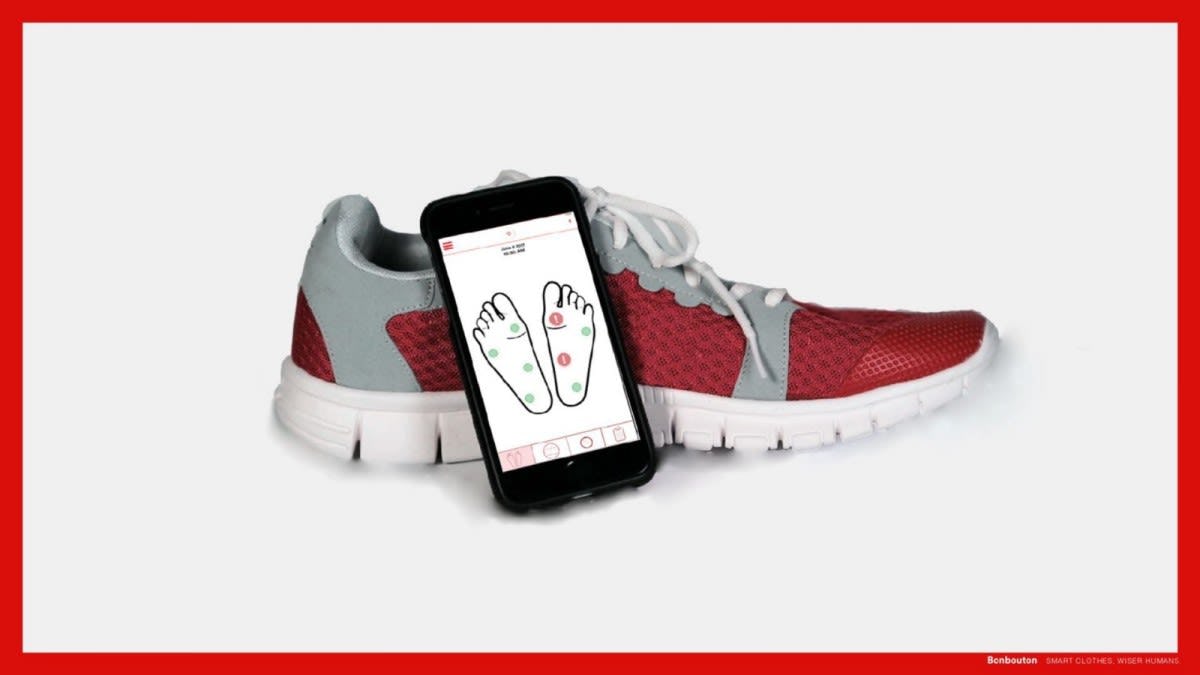A Stevens Institute of Technology team’s transformative technology launched one student’s entrepreneurial career and recently earned an Edison Patent Award from the Research & Development Council of New Jersey
It’s well-known that people with diabetes need to monitor their blood sugar, watch their diet, exercise and, depending on their condition, potentially take medication every day. What’s perhaps not as well-known is that the elevated blood glucose levels from diabetes can also cause these patients to suffer nerve damage in their feet, which in turn can lead to severe foot ulcers and, for 200 Americans every single day, the trauma of foot amputation.
That’s why former Stevens Institute of Technology student Linh Le founded Flextrapower — to commercialize a high-tech shoe insole for preventive diabetic healthcare, powered by the technology he helped develop and patent while at Stevens. Based on one of the patents granted to the lab team led by Woo Lee, chair of the Department of Chemistry and Chemical Biology, Stevens was recently recognized with a Research & Development Council of New Jersey Edison Patent Award.
A happy accident
Le came to Stevens in 2009 as a Ph.D. student studying chemical engineering and material sciences, and soon began working in Lee’s lab. In his earlier studies, Le had always loved working with carbon, and his professor was working on a U.S. Army project to figure out how graphene, a form of carbon, could become one of the first nanomaterials to be inkjet-printed, and what applications could use this innovation.
Graphene is known to be smooth, slippery and flexible. However, in their research, Le and fellow graduate student De Kong ’11 found some additional properties that weren’t yet known.
“We accidentally stumbled onto one of graphene’s novel properties as a negative temperature coefficient,” Le explained. “As a result, once it’s integrated onto a flexible surface, it can be turned into a flexible, thin and potentially transparent temperature sensor. That led to our co-invention of a graphene printing technology.”
Flextrapower – and Linh Le’s son Aiden – are born
While Le had trained as a scientist and made this key discovery as a scientist, he was realizing that in his heart, he was an entrepreneur. With Lee’s encouragement and support, Le audited several entrepreneurship classes and earned his graduate certificate in project management at Stevens, diving further into the potential applications of his work with graphene.
And then, the significance of his findings literally hit home.
“At that time, my wife was pregnant with our first son, Aiden, and she developed gestational diabetes,” Le said. “She was lucky to be able to manage the disease with her diet. But as I read more about diabetes, I realized how this condition could become dangerous for the hundreds of millions of people suffering from diabetes worldwide. One of the complications was diabetic foot amputation.”
Suddenly, his work took on a whole new purpose, and he realized how he could fulfill his dream of commercializing his proprietary technology of printing graphene onto flexible materials.
A carbon ‘footprint’ that’s actually good for the world
In 2012, Aiden was born, and in 2013, Le and his team launched his company, Flextrapower. Three years later, Flextrapower received its first National Science Foundation funding and Le left the Ph.D. program to fully dedicate himself to the company’s growth. Flextrapower’s first product is the Foot Health System, a high-precision, non-invasive, smart shoe insole that’s comfortable, pliable, transparent and an accurate gauge of temperature and pressure.
Connected to a mobile app for patients and a dashboard for healthcare providers, it’s intended to serve as an early alert for diabetic patients whose deteriorated nerves increase their risk of developing foot ulcers. In as little as four days, those foot ulcers can become irreversible and require foot amputation.
“A temperature change of just 4 degrees Fahrenheit can pose an 80% chance of a foot ulcer development over the next two weeks,” Le explained. “Now, we can catch this critical moment for the first time up to a quarter of a degree accuracy. Then we can alert the patient to seek medical attention that can prevent the ulcer development and save their feet – and even save their lives. If they don’t take immediate action, our digital service can notify family, friends and medical professionals in order to gain their support before it’s too late.”
The power of Edison
Le has developed clinical testing with NYU Langone Health and partnered with W. L. Gore, the maker of GORE-TEX®, to master the technology. He has five issued utility patents and three pending patents covering Flextrapower’s core technology, which was part of his Ph.D. work at Stevens.
And in November 2021, one of those patents, “Graphene-based Films in Sensor Applications” (U.S. 9,178,129), earned Stevens Institute of Technology an Edison Patent Award in the Technology Transfer category through the Research & Development Council of New Jersey. Winners were selected based on the significance of the problem, utility/socio-economic value, novelty and commercial impact.
“Growing up in Vietnam, I kept a book under my pillow about the first 100 inventions of Thomas Edison,” Le said. “It was one of the first biography books I read that had been translated from English to Vietnamese. As a 10-year-old, I knew almost every invention that Thomas Edison had created. This award is a dream come true.”
“Because of Linh’s effort and enthusiasm, we're about to make an impact in improving, and even saving, the lives of diabetes patients,” said Woo Lee of Linh Le’s graphene-based smart insole. “We need people like Linh to go through this difficult career pathway of trying to become an entrepreneur and bring innovative technology like this to market.” Le’s company, Flextrapower, has also developed a reusable, comfortable and breathable graphene COVID mask, and work on a smart compression shirt is underway.
Learn more about the Department of Chemistry and Chemical Biology at Stevens:
Chemistry and Chemical Biology Department




